ScheduleThe live sessions are being held in Baltimore, MD which is located in the Eastern Time Zone and will recognize Eastern Daylight Time (EDT) during the entire meeting. Times listed below are all EDT and plenary sessions include a link to a time zone converter tool. For some virtual participants, sessions may be the next day. Also be aware of upcoming daylight savings time changes in your country.
Tuesday, April 16
Virtual / 12:00–1:30 PM EDT
Virtual Poster PresentationsVirtual participants will present their research in the Gather Poster Halls. The presentation formats page has instructions for submitting posters, slides and videos to be installed. Reference the Presentations page for a list of all posters and talks and the Virtual Participation page for details about using Gather.
Gather »
Public Event / 6:00-9:00 PM EDT
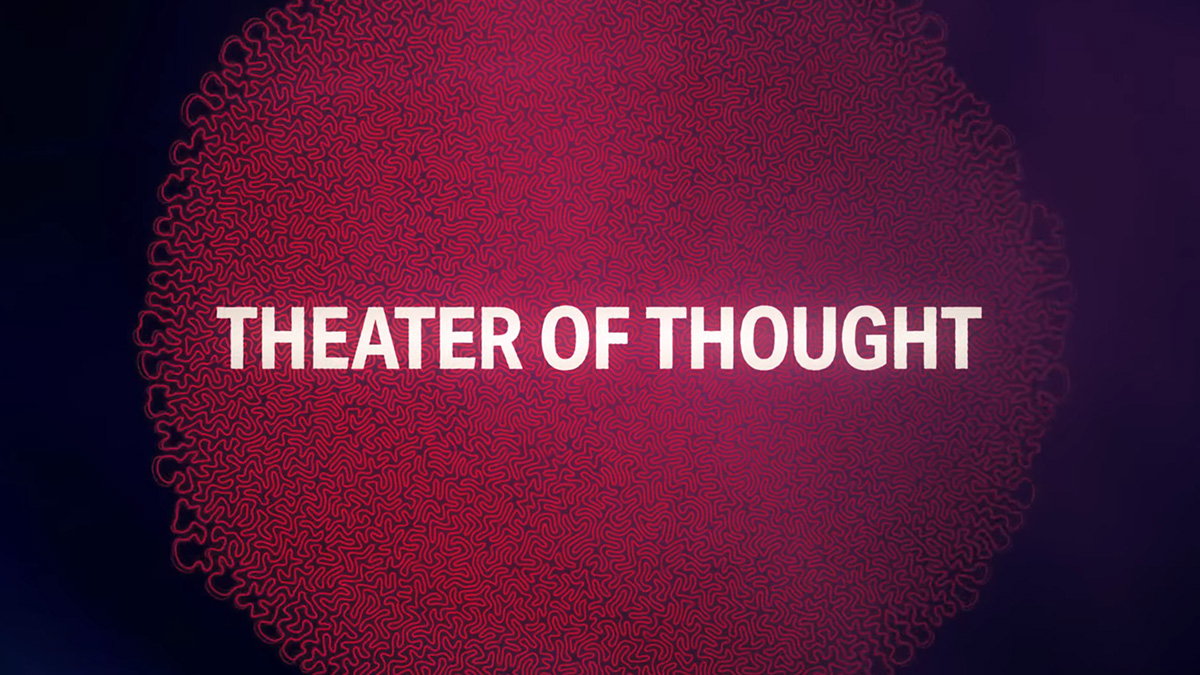 “Theater of Thought” Exclusive Screening and Neuroethics DiscussionThrough the lens of legendary documentary filmmaker Werner Herzog, Theater of Thought takes audiences on a provocative journey into the study of the mind and consciousness. The film will be screened at 6:00pm and will be followed by a panel discussion featuring members of the cast.
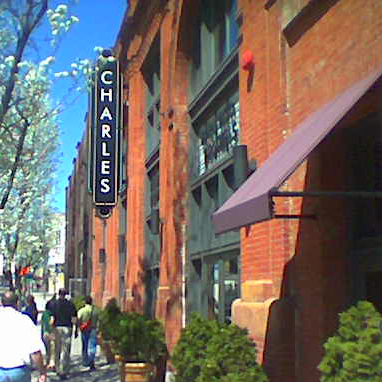 This pre-conference in-person event will be held at the Charles Theater, 1711 N Charles St. This free event is open to the public. A separate registration is required. Please arrive before 6:00 p.m.
Charles Theater · 1711 N Charles St, Baltimore, MD 21201
There will be no virtual broadcast of the film or discussion.
Wednesday, April 17
 Conference sessions on Wednesday, Thursday and Friday will be held at The Belvedere, located in historic Mt. Vernon in downtown Baltimore. The address and entrance is: 1 East Chase Street. All sessions will be held on the 12th floor in the Grand Ballroom and Platinum Ballroom.
The Belvedere · 1 East Chase Street, Baltimore, MD 21202
Plenary / 9:00–10:30 am EDT
Hybrid Minds: What is it like to use neuroprostheses, and why does it matter?This panel considers neuroprostheses that integrate the brain, mind, neurotechnological artifact and software into a hybrid form that blurs the boundaries between devices, body and mind — which we call the hybrid mind. Four presentations addressed these different aspects of the hybrid mind.
Break / 30 minutes
Plenary / 11:00 am EDT
Mind Meets Art: Neurology, Research Participation, and Social JusticeIn this panel discussion, speakers reflected on the challenges and opportunities of participatory and social justice arts to disrupt dominant neurological disease narratives.
Break / 12:00–1:00 PM EDT
Lunch
Plenary / 1:00–2:30 PM EDT
Mentoring Lecture by Sara GoeringSara Goering, recipient of the Judy Illes Award, gave a talk about mentoring.
Watch Talk
Mentoring ActivityMatched mentors and mentees used this time to meet with each other. In-person attendees met in the conference space and virtual participants met in Gather. Everyone not matched was encouraged to mingle and talk with other attendees.
Break / 2:30 PM EDT
Plenary / 3:00–4:00 PM EDT
Research Talks
Watch Talks »
Concurrent / 4:00–5:00 PM EDT
In-Person Poster PresentationsThis session will focus on poster presentation judging. All in-person presenters are expected to present for a judge. See the presentation formats page for details and instructions. In-person presentations will not be broadcast.
Virtual Poster PresentationsVirtual participants will present their research in the Gather Poster Halls. The presentation formats page has instructions for submitting posters, slides and videos to be installed. Reference the Presentations page for a list of all posters and talks and the Virtual Participation page for details about using Gather.
Adjourn / 5:00 PM EDT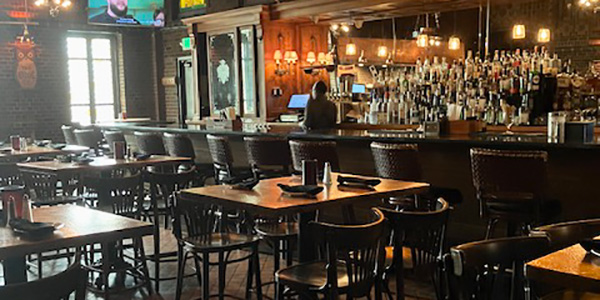 The Owl Bar, 1 East Chase Street, Baltimore, MD 21202
In-Person Networking at Owl BarStarting right after the poster session, there will be a networking happy hour from 5-6pm at the Owl Bar, located on the first floor of the conference venue. Light appetizers will be provided and attendees can purchase their own drinks. All are welcome to join. The space will allow for about 25-30 people in our party. Students, trainee, and first-time meeting attendees are especially encouraged to attend.
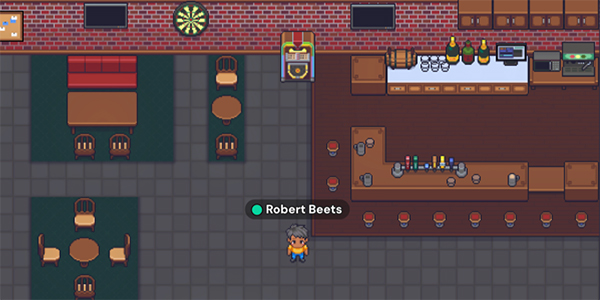 Virtual Networking in GatherJoin your colleagues from around the world in the Gather Lounge.
Gather »
Thursday, April 18
The Belvedere · 1 East Chase Street, Baltimore, MD 21202
Plenary / 9:00–10:00 aM EDT
The Challenges of Neuroenhancement: Comparative Legal Perspectives from US, EU, and JapanThis session focused on the progress of neurotechnology in the broadest sense and its potential applications for improving human function in the near future, such as improving performance in athletic, academic, and professional environments. The state of national, regional, and even international laws and regulations will then be discussed from the perspectives of constitutional law, culture, and public policy.
Recording »
Plenary / 10:00–10:30 AM EDT
FDA Fireside ChatThis session explored FDA perspectives on and experiences with protecting patients in neurological device research and translation, and associated neuroethics considerations.
Recording »
Break / 30 minutes
Concurrent / 11:00 am–12:00 PM EDT
Drawing What Matters: A Comics WorkshopIn this hands-on workshop, participants will use comics to identify and reflect on the neuroethics issues that they find most pressing. The engagement is a means of building relationships in solidarity, and of recognizing historically marginalized voices, forms of expression, and narratives.The workshop will be guided by facilitators with experience in neuroethics, education, the arts, and social justice.
This event will not be broadcast to virtual participants.
Concurrent / 11:00 AM–12:00 PM EDT
MindMaestroes: A Neurofeedback Now & Perspectives for the FutureThis session will be a guided exploration of the MindMaestroes interactive audiovisual brain–computer interface installation. Guided by the creators, users can generate an audiovisual scene using their neural signals. The creators will also discuss the prospects of and potential applications of similar BCI systems.
Concurrent / 11:00 AM–12:00 PM EDT
Demystifying NIH BRAIN Initiative Neuroethics Funding: Opportunities, Guidance, and even a few AnswersIn this roundtable discussion, BRAIN Neuroethics Program leads and BRAIN Initiative supported neuroethicists will provide an overview of funding opportunities for supporting neuroethics research across multiple stages of the career development pipeline. Presenters will share their unique experiences across a range of funding mechanisms, discuss BRAIN Initiative scientific priorities and funding processes, and share resources for developing competitive applications.
Break / 12:00–1:00 PM EDT
Lunch
Plenary / 1:00–2:40 PM EDT
Research TalksAuthors of top abstract submissions will present their research and answer audience questions. Presenting authors are in bold. Approximate start times for each talk are in parentheses.
Watch Talks »
Break / 20 minutes
Concurrent / 3:00–4:00 PM EDT
In-Person Poster PresentationsThis will be an open presentation and networking time for authors and attendees. See the presentation formats page for details and instructions. In-person presentations will not be broadcast.
Virtual Poster PresentationsVirtual participants will present their research in the Gather Poster Halls. The presentation formats page has instructions for submitting posters, slides and videos to be installed. Reference the Presentations page for a list of all posters and talks and the Virtual Participation page for details about using Gather.
Plenary / 4:00–5:00 PM EDT
Awards and RecognitionsWe recognized members of our community making significant life-long contributions to the field and authors of outstanding talks and posters presented at the meeting.
Performance / 6:00 pm EDT
Stavros Niarchos Foundation Parkway Theatre, 5 W North Ave, Baltimore, MD 21201
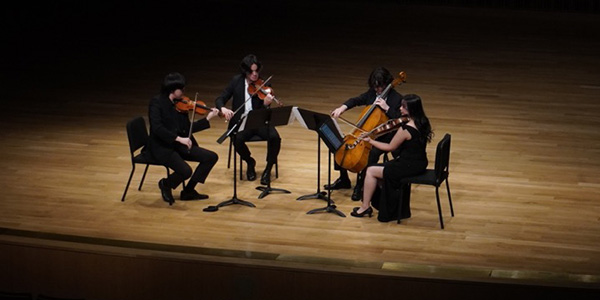 Music, Movement and Healing: Ethical Considerations in Embodied ExperienceIncorporating musical and dance performance, dialogue, and participatory creative activity, this presentation will explore the ways in which both beholding and participating in music-making and dancing can release sensations and emotions. While music and dance have the power to heal, they also have the power to harm. How can they be introduced into the medical environment safely, and what ethical issues arise when we do so?
Nosremé Quartet musicians (pictured):
Sponsored by:
Friday, April 19
Plenary / 9:00-10:30 am EDT
Neurorights DebateDo emerging neurotechnologies raise fundamental new questions that are not addressed by current regulations? Do we need new human rights to address issues raised by emerging neurotechnologies? This session brings together four debaters from diverse geographical locations for an interactive discussion about neurorights and neurotechnology governance.
Recording »
Break / 30 minutes
Plenary / 11:00 am–12:00pm EDT
Stigma and the Brain Disease Model of Chronic Pain – Helping or Hurting?This session explores the neuroethical implications of brain disease explanations of chronic pain on stigma. Panelists’ presentations shed light on the complexities of neuroessentialist explanations of chronic pain and explore potential avenues for improving interventions in pain management to reduce rather than entrench stigma for people living with chronic pain.
Recording »
Plenary / 12:00 pm EDT
Closing remarks
Adjourn / 12:30 pm EDT
|

